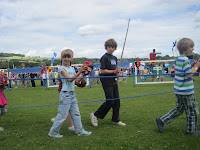[Sharon blogging]
The following is an epic poem by Miss Maeve Dever, inspired by a confluence of repeatedly reading
Rob Roy and Sir Patrick Spens, and visiting a very large number of castles. Reproduced here
verbatim.
The Robbers
Part I
The full moon is out tonight,
The full moon is out,
And I too am out tonight,
Out and about.
To the darkest farm-house
The farmer fast asleep,
To the quiet farm-house
Stelthily I creep.
For the gold and plunder
Far have I come,
So through the farm-house
Now do I roam.
I have found the treasure-chest
In the horse's barn,
Now I bring back
Jewels and gold again.
Back in the camp-site
Well have I done,
But on my next quest I will
Swim the ocean foam.
Part II
On the wind swept beach I stand,
On the beach I stand,
Looking out on the ocean blue,
Blue and green and grand.
Now, my dagger by my side,
My dagger sharp and strong,
I swim out on the ocean deep
Blue and green and grand.
To the war-ship's side I swim,
My dagger in my hand,
I bore one hole, and two, and three,
And now I turn around.
And now the ship's boat I am on,
Seizing the golden jug,
And I sink the ship's good boat,
And beat the water to foam.
And now across the land I run,
To the campsite safe,
In the forest trees wherin
All robber men are safe.
And I will hide the golden jug
In the treasure store,
And I will come back many a time
To hide my treasure there.
I know not if I'm going to have
Another guest this day
Or if it will be a year
Till I shall go away.
Part III
And now out side the castle I stand
With nothing in my hand,
And now around the castle I walk
Searching for a door.
And now the door at last I find,
And I enter it,
And I stand before the throne,
And look around a bit.
And when I see that no-one is here,
I take the septer jeweled,
And when I think of it I take
The golden crown as well.*
Part IIII**
And to the campsite I do not go,
But wait till the king comes in,
And state my case to him and show
The golden septer and crown.
The king agrees that I may rule,
The next day I am crowned,
And the first day that I rule,
I pas this law around.
That no robber they may hurt,
But bring them to the king,
To see if they may be set free,
And not to injure them.
And though my life is better than theirs,
I am a robber still,
For through the land I go to rob,
But I am ruler too.***
---------------
*These stanzas were apparently inspired by Edinburgh Castle, where Maeve much admired the "secret entrance" postern door in the back wall of the castle, and the crown jewels of Scotland together on display there with the Stone of Scone.
**She really does know her Roman numerals, but prefers the IIII on clockfaces to the standard IV.
***No comments from our Republican readers, please.



















































































